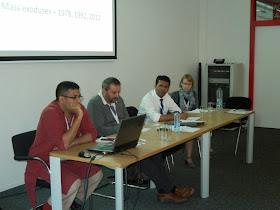RB News
September 25, 2014
Burmese Rohingya Organisation (BROUK) President, Tun Khin, joined the first Global Stateless Forum at the Hague, Holland from 15-17 September 2014. The Global Stateless Forum was co-hosted by UN High Commissioner for Refugees (UNHCR), the agency mandated by the General Assembly to help states to address statelessness, and the Statelessness Programm of Tilburg University.
Mr. Tun Khin presented research and documentation on the 1982 citizenship law which deprived basic fundamental rights of Rohingya and which made Rohingyas stateless in their own state.
BROUK President Tun Khin participated in two panels during the event. The first Panel was about Experiences of Statelessness and displacement. The speakers include Dr. Elena Fiddian-Qasmiyeh from Oxford University and Dr. Nell Gabiam who is visiting Researcher at The Centre for Contemporary Arab Studies, Georgetown University Washington DC, USA.
The second Panel was on Myanmar and Mr. Tun Khin joined along with Amal De Chickera (Senior Consultant on Statelessness, the Equal Trust) who talked with the title “Human Rights of Stateless Rohingya”, Ms. Katherine G. Southwick (Research Associate, Centre for Asian Legal Studies, National University of Singapore) with the title Statelessness and Genocide in a Transitional State.
Mr. Tun Khin particularly highlighted that 1982 Citizenship Law needs to be understood not in legal isolation, but as part of a broader process of ethnic cleansing and destruction of the Rohingya as an ethnic group in Myanmar, which holds in place and sanctions multiple anti-Rohingya policies and practices. This process has important regional consequences as populations and conflicts spill over into the region. The international community should not consider the 1982 Citizenship Law as simply a sensitive domestic issue to be dealt with internally by the Government of Myanmar. Both Myanmar and the international community have the responsibility to protect Myanmar’s population, including the Rohingya, especially where there is evidence of ethnic cleansing and crimes against humanity.
Mr. Tun Khin raised the issue with UNHCR about resettlement of Rohingya refugees from Bangladesh, India, Thailand, Malaysia and Indonesia.




No comments:
Post a Comment